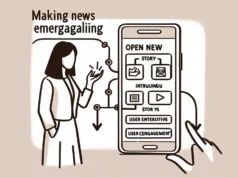In the ever-evolving world of digital journalism, the challenge is increasingly becoming one of striking the right balance between engagement and credibility. As the lines between fact and opinion blur, and as false news spreads like wildfire via social media and other online platforms, news publishers are grappling with the daunting task of maintaining their reputation for accuracy and trustworthiness while appealing to an online audience that is largely driven by relatability and entertainment. The battle for clicks, shares, and likes can sometimes compromise the quality of journalism, threatening its role as the fourth estate. But in the quest for digital survival, it’s a balance that must be struck.
The digital revolution has indeed transformed news consumption. In a world hooked onto smartphones, readers are no longer waiting for the morning paper. News breaks and spreads in real-time over Twitter, Facebook, and Google News. This digital shift is not just about where news is consumed, but the nature of the news itself. The shift to digital media has generated an increase in interactive, engaging content that makes a complex story easier to grasp. Infographics, animations, and videos are commonplace, capturing readers’ attention and interest.
But therein lies the challenge. While the new digital landscape has led to innovations in the way news is presented, the competition for attention has sometimes crossed the line. The pressure to drive consumer engagement often pushes news organizations to opt for sensationalism, flashy headlines, and provocative content, putting the credibility of journalism at stake. Readers today are exposed to a barrage of news articles, blog posts, tweets, and posts. The cut-throat competition to attract viewers or readers means publishers frequently resort to clickbait tactics, compromising the quality of the news, and even dipping into misinformation or disinformation.
On the other hand, credibility – unbiased, accurate, and truthful reporting – is the cornerstone on which journalism is built. News organizations that value their reputation must guard their credibility fiercely if they want to be seen as reliable sources of information. Breaches of trust, for whatever reason, can be detrimental to the organization’s reputation and can also alienate the audience it serves.
So, how can digital newsrooms balance the two?
Some argue that the solution lies in news literacy education, urging readers to be more discerning and critical of the news they consume. Many experts believe that publishers must take it upon themselves to ensure their readers can distinguish between opinion and fact-based reporting. This might include clearer labeling of different types of content, more transparency about the processes of newsgathering, and reasoning behind editorial decisions.
Verification and fact-checking are other key tools at a journalist’s disposal. Companies like Google, for example, have launched initiatives such as Project Shield and the Google News Initiative Training Network, aimed at teaching journalists the latest technology to counter misinformation.
Meanwhile, innovations in technology offer opportunity as well. Artificial intelligence is being harnessed to enhance the accuracy and speed of news reporting. For instance, Google’s Fact Check Explorer and Full Fact, an independent fact-checking charity in the UK, are using automated fact-checking tools to help journalists verify information in real-time.
Ultimately, the challenge of balancing engagement with credibility in the digital age comes down to combining good journalism with smart digital strategies. While it’s vital for journalists to understand their audiences and utilize digital tools to engage them, they must resist the tendency to compromise accuracy for attractiveness. Just as the tech-savvy audience today prefers quick access to news, they also value reliable, trustworthy information. Meeting these twin expectations is the only path to success in the dynamic digital journalism landscape.
Sources:
1. Project Shield | Google Developers. https://developers.google.com/project-shield
2. Full Fact. https://fullfact.org/
3. Google News Initiative Training Network. https://newstraining.withgoogle.com/
4. Google Fact Check Explorer. https://toolbox.google.com/factcheck/explorer






